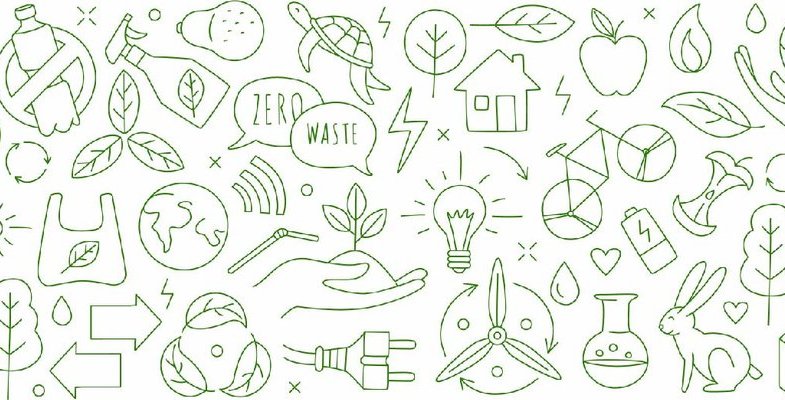Sustainability and the environment
The College's strategy for a sustainable future
Acknowledging the detrimental effect of climate change on the population – most of whom become our patients at some point in their lives – is an important step towards reducing the negative impacts of pathology on the environment. The College recognises that it has a responsibility to promote the prudent use of resources amongst its members and staff as appropriate in order to protect the environment.
The College aspires to reduce and minimise the environmental impact of its activities and to advocate for the health of our planet, by collating and disseminating examples of good practice in pathology, and educating and inspiring members to adopt these practices.
Trustee Board has appointed Dr Bernie Croal (President) and Daniel Ross (Chief Executive) as the College's sustainability leads.
In May 2020 we produced a strategy to provide clarity for both members and staff on:
- the purpose of and a proposal for sustainable activities
- a College policy regarding the environment and sustainability
- a framework for action that contributes towards sustainability.
We will also review and update our existing environmental policy and introduce a framework for activities in support of sustainability initiatives.
We are in the process of developing a Net Zero strategy and carbon reduction roadmap for our operational activities, with the aim of presenting this to the Board for discussion in December 2023. This will include a quantification of our baseline carbon footprint.
Meetings & events sustainability framework
- All College events run either wholly virtually, or if being run face to face are on a hybrid basis with an option to attend the meeting using video conferencing facilities.
- Video conferencing facilities have been upgraged in 2022 for most rooms, and will continue into 2023. Dedicated audio visual staff have been recruited so as to ensure that online only or hybrid events run smoothly.
- Encouraging those attending meetings to travel by public transport in favour of cars, planes, taxis. A map of our location is provided detailing all of the local public transport options.
- We have secure bicycle storage facilities at our premises in Alie Street and have changing and shower facilities available for use by all visitors to the premises.
- The catering operations at Alie Street are run on a sustainable basis, and the College has a food waste policy.
- We only provide filtered tap water at events, we do not purchase in bottled water.
- We only use reusable tableware, no single use plastic such as cups, plates or cutlery are used.
- We regularly review the frequency of meetings and the number of committee members attending.
- Using motion sensitive lighting in office and meetings rooms.
- Ensuring that low-energy light bulbs are used where appropriate.
- Turning off computers, computer screens, photocopiers and printers at night.
- The College premises have a BREEAM (Building Research Establishment Environmental Assessment Method) rating of Excellent. BREEAM focuses on sustainable value and efficiency.
- We have installed solar panels on the roof of the College premises, and additionally a green roof.
- The premises are air cooled rather than air conditioned.
- The premises have passive infrared (PIR) detectors that automatically switch off lights when rooms or areas are not in use.
- We recycle rainwater collected from the roof.
- Since 2020 the College's Part 1 examination has been held online which stops candidates travelling to examination centres far away from where they are located and no longer necessitates candidates flying to other countries for that examination.
- The College has introduced a salary sacrifice electric car lease scheme for employees, at no cost to the College. This allows staff to acquire fully electric vehicles and thus remove petrol/diesel vehicles from the roads.
- Promoting the policy of the ‘paperless office’ to use less paper by adopting electronic means such as scanning documents for filing and sending committee papers by email.
- Recycling general office waste where possible.
- The College Bulletin and Annual Report are now produced only in electronic form.
- We encourage committee and other meetings to take place electronically if possible rather than face to face.
- Using publishers/printers for publications who supply paper from sustainable sources and/or have Forest Stewardship Council accreditation.
- Using photocopiers that incorporate copying, scanning and printing facilities, thus avoiding the need for separate, additional machines.
- Photocopying and printing on both sides of the paper.
- Recycling PCs at the end of their useful life.
- Setting computers to ‘sleep’ mode (i.e. to switch off after a certain time when not in use).
Kitchen and food waste
- We participate in a food waste distribution scheme, donating surplus food to charity where possible.
- Placing food waste that cannot be distributed and non recyclables into the designated waste bins situated in the kitchen.
- Dedicated bins for recycables.
- Using filtered tap water instead of bottled water.
- Monitoring water leaks.
The College's investment portfolio comprises a single investment in the CCLA (Churches, Charities and Local Authorities) COIF (Charities Official Investment Fund) Charities Ethical Investment Fund. The fund has a wide range of ethical restrictions including there being no holdings in fossil fuel, tobacco, armaments (including landmines, cluster bombs, general weapons/munitions, chemical/biological weapons and/or nuclear weapons), alcohol, gambling, pornography or high interest lending companies. Details of the individual holdings of the fund are not presented here as the fund is actively managed by CCLA and holdings are subject to change. Full details of the fund, including a list of holdings, can be obtained via
the Fund’s webpage.

